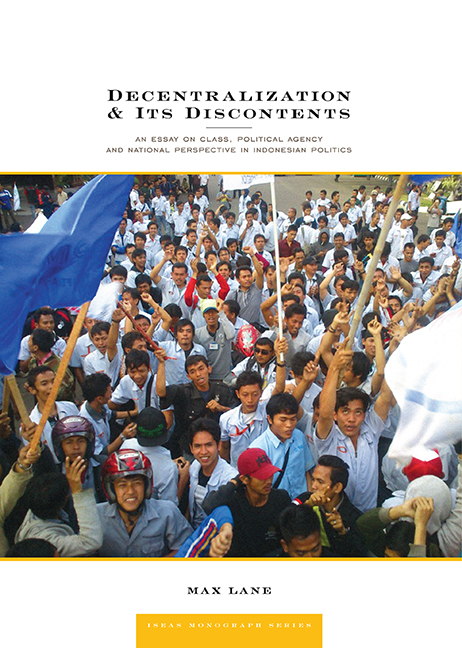 Decentralization and Its Discontents
Decentralization and Its Discontents Book contents
- Frontmatter
- Contents
- Editorial Note
- Preface
- About the Author
- Introduction
- I The Enigmatic Emergence of Decentralization
- II The Political Economy of Desentralisasi
- III Decentralization: Its Discontents
- IV National Agency in a “Co-ordinative State”: The Future of Decentralization
- Conclusion
- Endnotes
- References
IV - National Agency in a “Co-ordinative State”: The Future of Decentralization
Published online by Cambridge University Press: 21 October 2015
- Frontmatter
- Contents
- Editorial Note
- Preface
- About the Author
- Introduction
- I The Enigmatic Emergence of Decentralization
- II The Political Economy of Desentralisasi
- III Decentralization: Its Discontents
- IV National Agency in a “Co-ordinative State”: The Future of Decentralization
- Conclusion
- Endnotes
- References
Summary
The case of East Kalimantan, namely a non-ethnically based call by a regional elite for a federal state, points to a major change in how the decentralized structuring of the Indonesian state needs to be discussed. In the past, issues of decentralization have been discussed in a “region versus centre” or “Java versus outer Islands” framework. While it is true that Kalimantan is an “Outer Island”, Amien Rais, first advocate of federalism, comes from Java and his party, while with strong support in Sumatra and elsewhere outside Java, also has a key support base on parts of the island of Java. The support for federalism in East Kalimantan has no real connection to identity or any aspect of geo-ethnic definition. Neither did any of Rais's justifications for federalism, nor later arguments favour decentralization.
The new situation that has arisen and continues to evolve does not pit outer regions against the centre but localism against national perspective. This is also consistent with the demands for decentralization which developed after 1999 from kabupaten and municipalities on the island of Java itself, even resulting in kabupaten splitting to form new ones. It reflects developments of contradictions more radical than those represented by the old region-versus-centre tensions. To the extent that some of the regional elites campaign for federalism or independence, and for greater and greater decentralization reflects a lack of interest among them in any perspective on national political or economic development. Federalists presented arguments that a federal state would not lead to a break-up of Indonesia. However, a break-up into several separate states is not the danger that is threatened by contemporary developments. It is rather a stagnation or disintegration of function of the national economy and political processes. Such a dysfunction, stagnation or disintegration relates not so much to the running of day-to-day state functions, but to solving national problems and fostering national development. There is a tension between national and local perspectives, embodied in the absence of a capacity to coordinate to achieve evenness among the country's heterogeneity and in the ideology of local ownership or priority of access to natural resources.
- Type
- Chapter
- Information
- Decentralization and Its DiscontentsAn Essay on Class, Political Agency and National Perspective in Indonesian Politics, pp. 71 - 102Publisher: ISEAS–Yusof Ishak InstitutePrint publication year: 2014
